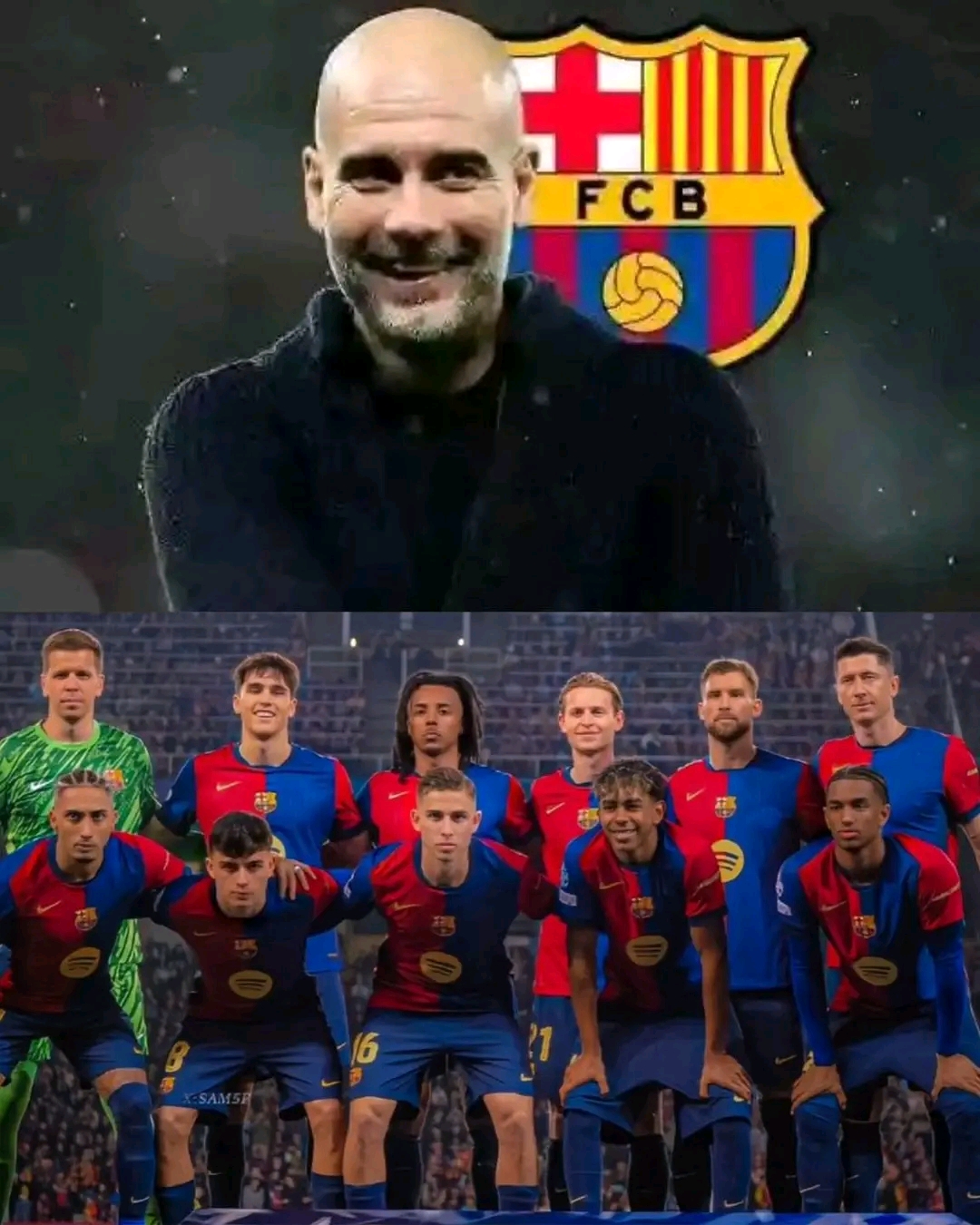Manchester City considering a €100 million bid for ‘untouchable’ Barcelona Star

Barcelona’s reaction to Manchester City’s interest has been swift and unequivocal. The Catalan giants have moved quickly to shut down any speculation regarding Pedri’s availability, with club sources confirming that no official approach has been made by Manchester City and emphasizing that the midfielder remains “untouchable.”
This defensive stance reflects Barcelona’s understanding of Pedri’s importance to their project. In an era where the club has faced significant financial challenges and has been forced to make difficult decisions regarding player recruitment and retention, Pedri represents a rare success story. His development from a promising youngster to a world-class midfielder has provided Barcelona with both on-field success and a valuable asset that forms the cornerstone of their future plans.
The club’s determination to retain Pedri is further evidenced by the contract extension he signed earlier this year. The new deal, which keeps him at Barcelona until 2030, includes a significant release clause that serves as a deterrent to potential suitors. This contractual commitment represents a mutual investment in the future, with Barcelona securing their prized asset while providing Pedri with the stability and security necessary to continue his development
The tactical rationale behind Manchester City’s interest in Pedri extends beyond his individual brilliance to encompass how his skill set would complement Guardiola’s philosophical approach to football. Pedri’s playing style embodies many of the characteristics that Guardiola values most highly in his midfielders: technical excellence, positional intelligence, and the ability to execute complex tactical instructions under pressure.
Pedri’s passing ability represents perhaps his greatest asset in the context of Manchester City’s system. His range of passing, from short, intricate combinations to long, defense-splitting balls, would provide Guardiola with the creative outlet necessary to unlock stubborn defenses. His ability to find space in congested areas and maintain possession under pressure aligns perfectly with Manchester City’s possession-based approach.
The young Spaniard’s work rate and defensive contribution would also prove invaluable in Guardiola’s system. Modern football demands that midfielders contribute both offensively and defensively, and Pedri’s willingness to track back, press opponents, and win back possession demonstrates the kind of tactical discipline that Guardiola requires from his players.
Perhaps most importantly, Pedri’s age and adaptability suggest that he would be capable of evolving within Manchester City’s system. Unlike established stars who might struggle to adapt to new tactical demands, Pedri’s youth and learning capacity would allow him to develop his game in response to Guardiola’s coaching, potentially reaching even greater heights than those he has already achieved
The potential transfer of Pedri to Manchester City would have implications that extend far beyond the two clubs involved. Such a move would represent a significant shift in the balance of power between Barcelona and Manchester City, two clubs that have often found themselves competing for the same targets in the transfer market.
For Barcelona, losing Pedri would represent more than just the departure of a talented player; it would symbolize their inability to retain their most promising talents in the face of financial pressure from wealthier competitors. The club’s recent history has been marked by the forced departures of several key players due to financial constraints, and Pedri’s potential exit would represent another chapter in this troubling narrative.
For Manchester City, successfully securing Pedri’s signature would demonstrate their continued ability to attract the world’s best talents, regardless of their current club affiliations. It would send a message to the football world that Manchester City’s project remains as ambitious and appealing as ever, capable of convincing even the most committed players to consider new challenges.
The transfer would also have significant implications for the broader transfer market. A €100 million move for Pedri would establish a new benchmark for midfielder valuations, potentially influencing the pricing of similar talents across Europe. The ripple effects of such a transfer could be felt throughout the football ecosystem, from academy development programs to contract negotiations at clubs across the continent.
From Pedri’s perspective, the interest from Manchester City presents both an opportunity and a dilemma. On one hand, the chance to work under Pep Guardiola, widely regarded as one of the greatest coaches in football history, represents an extraordinary opportunity for professional development. The prospect of competing for major trophies in both domestic and European competitions with Manchester City would undoubtedly appeal to any ambitious footballer.
On the other hand, Pedri’s commitment to Barcelona runs deep. His journey from Las Palmas to Barcelona represents the realization of a childhood dream, and his integration into the club’s culture and philosophy has been seamless. The responsibility of being a key figure in Barcelona’s rebuilding project, combined with the trust placed in him by the club and its supporters, creates a strong emotional bond that transcends purely professional considerations.
The recent contract extension that Pedri signed with Barcelona provides some insight into his mindset. The decision to commit his future to the club until 2030 suggests a genuine desire to be part of Barcelona’s long-term project. However, the dynamic nature of modern football means that circumstances can change rapidly, and the allure of new challenges and opportunities can sometimes override previous commitments
The complexity of modern football transfers means that the wishes of the player and the clubs involved represent only part of the equation. Agents, advisors, and external influences play increasingly important roles in shaping transfer decisions, and the potential move of Pedri to Manchester City would likely involve numerous stakeholders with varying interests and motivations.
Player agents have become increasingly powerful figures in football, capable of influencing their clients’ career decisions through a combination of financial incentives, career advice, and market positioning. In Pedri’s case, his representation would likely be considering not just the immediate financial benefits of a potential move to Manchester City, but also the long-term implications for his career development and commercial opportunities.
The influence of national team considerations cannot be overlooked either. Pedri’s status as a key player for the Spanish national team means that his club career choices could have implications for his international prospects. The competitive environment at Manchester City, combined with the opportunity to play alongside and against the world’s best players, could potentially enhance his development as an international player.
The proposed €100 million transfer would also need to be considered within the context of Financial Fair Play regulations and other regulatory frameworks that govern modern football. Both Manchester City and Barcelona have had previous encounters with UEFA’s financial monitoring processes, and any major transfer between the two clubs would likely be subject to significant scrutiny.
For Manchester City, the ability to spend €100 million on a single player would need to be balanced against their existing financial commitments and revenue streams. The club’s strong commercial performance and revenue generation capabilities provide them with significant flexibility in the transfer market, but they must still operate within the bounds of financial regulations.
Barcelona’s position is more complex, given their well-documented financial challenges in recent years. The potential sale of Pedri, while unwelcome from a sporting perspective, could provide the club with significant financial relief and the opportunity to address other areas of their squad. However, the loss of such a valuable asset would also represent a significant blow to their long-term competitive prospects.
Beyond the tactical and financial considerations, the potential transfer of Pedri to Manchester City would involve significant psychological and cultural adjustments. Moving from Barcelona to Manchester represents more than just a change of club; it involves adapting to a new country, language, and cultural environment.
For a player who has spent his entire professional career in Spain, the transition to English football would present both challenges and opportunities. The physical demands of the Premier League, combined with the intense media scrutiny and cultural differences, would require significant adaptation. However, the opportunity to experience a new footballing culture and to test himself against different types of opponents could prove invaluable for his development as a player.
The psychological impact of leaving Barcelona, a club with which he has such strong emotional ties, would also be significant. The pressure of justifying a €100 million transfer fee, combined with the expectation of replacing a legend like Kevin De Bruyne, would create intense scrutiny and pressure. Pedri’s mental resilience and ability to handle such pressure would be crucial factors in determining the success of any potential move.
The potential transfer of Pedri to Manchester City would likely unfold over several months, involving complex negotiations between multiple parties. The initial stage would involve Manchester City making a formal approach to Barcelona, testing their resolve and willingness to engage in negotiations.
Barcelona’s response to any formal offer would be crucial in determining the trajectory of the negotiations. Their current stance of refusing to entertain any offers suggests that Manchester City would need to significantly increase their proposed fee to even begin meaningful discussions. The psychological barrier of €100 million might need to be breached for Barcelona to seriously consider the proposal.
The negotiation process would also involve extensive discussions between Manchester City and Pedri’s representatives. Convincing the player to leave Barcelona would require a compelling package that addresses not just financial considerations but also sporting ambitions, career development opportunities, and personal circumstances.
The potential transfer of Pedri from Barcelona to Manchester City represents more than just a player changing clubs; it embodies the defining characteristics of modern football. The astronomical transfer fee, the global media attention, the complex web of stakeholders involved, and the strategic implications for both clubs reflect the evolution of football from a sport into a global entertainment and business phenomenon.
Whether this transfer ultimately materializes remains to be seen. Barcelona’s determination to retain their prized asset, combined with Pedri’s apparent commitment to the club, suggests that Manchester City face a significant challenge in their pursuit. However, the history of football transfers teaches us that circumstances can change rapidly, and the allure of new challenges and opportunities can sometimes override even the strongest commitments.
What is certain is that the pursuit of Pedri demonstrates Manchester City’s continued ambition to compete at the highest level of world football. Their willingness to invest €100 million in a single player reflects their understanding that sustained success requires constant evolution and the acquisition of exceptional talents.
For Barcelona, the interest in Pedri serves as both a validation of their youth development capabilities and a reminder of the challenges they face in retaining their best players in an increasingly competitive market. The club’s response to Manchester City’s interest will be closely watched as an indicator of their financial health and competitive ambitions.
As the football world watches this potential transfer saga unfold, one thing remains clear: the pursuit of Pedri represents the relentless ambition and financial power that defines elite football in the modern era. Whether it results in a transfer or not, the story of Manchester City’s €100 million pursuit of Barcelona’s “untouchable” star will be remembered as a defining moment in the ongoing evolution of football’s transfer market.
The coming months will reveal whether Manchester City’s ambition can overcome Barcelona’s determination, and whether Pedri’s loyalty to his current club can withstand the allure of new challenges and opportunities. Whatever the outcome, this transfer saga will undoubtedly be remembered as one of the most significant stories of the current transfer window, emblematic of the passion, ambition, and financial power that drives modern football forward.















